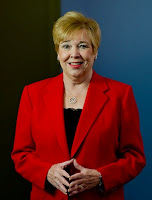Occasionally I have guest blogs on this site when I think the article is interesting and more importantly relevant to owner managed businesses. I have been recently running articles on structuring sales processes and building effective sales pipeline reporting tools. I read this article from Barbara Weaver Smith on her mission to help small businesses sell to big companies - "to" as they say "land whales"
Laurence Ainsworth
---------------------------------------------------------------------
 Image via WikipediaPundits are calling it “sales 2.0” or “the new world of sales.” Whatever you call it, the story line is the same—Elvis is dead. If you are going to make bigger sales to bigger customers, a rock star salesperson is not the way to go.
Image via WikipediaPundits are calling it “sales 2.0” or “the new world of sales.” Whatever you call it, the story line is the same—Elvis is dead. If you are going to make bigger sales to bigger customers, a rock star salesperson is not the way to go.Chances are you built your company selling to companies with which you had some things in common—same region, shared friendships and associations, maybe even similar size and years in business. Almost like friends and family.
But to take your company to the next level, you need to venture out into new, unfamiliar territory, where you will meet tougher customers and much tougher competition. To do that, you need a sustainable sales process that rests on the performance of a cross-functional team, not a rock star.
Here’s why.
- · Big companies (we call them “whales”) are afraid to do business with small companies. They are afraid you can’t deliver, that you will run out of capital, that you don’t understand how big companies work, and that your operations and customer service teams are just not sophisticated enough. No matter how much they want your innovative solution, they won’t buy it unless you alleviate all of those fears. And your sales person can’t do that! It will require participation of key subject matter experts, deeply involved in the sales process.
- · The buyers in big companies (end users or purchasing agents) will never lose their jobs over a conventional choice of vendor. But they can definitely lose their jobs if they award a big contract to an unknown provider and the project tanks. You will have to win them over with the strength—breadth and depth—of your team.
- · The corporate environment is getting much more stringent about the nature of relationships between their buyers and all sellers. They want to increase the distance between buyers and sellers and reduce familiarity. They want to avoid even the appearance of collusion or any improper value exchange. Your rock star salesperson, charismatic hail-fellow-well-met, is likely to have serious difficulty in making this transition.
So, what is the alternative? Go from a solo act to an orchestra. You need to develop a disciplined, systematic sales process, overseen by senior management, in which each pursuit of a large sale is directed by a skilled sales person who is not a rock star but a conductor guiding the performance of a cross-functional team.
The Whale Hunters Process™ advocates a plan of three stages—Scouting, Hunting, and Harvesting. The plan is designed to get your company positioned to sell deals at 10 to 20 times your current average account
The “scout” stage involves creating a Target Filter—a profile of your ideal customer—r researching the most promising companies, watching their behavior over time, and calling on them when they may have a propensity to buy.
In the “hunt” stage, train key subject matter experts to participate in the sale and develop a systematic process of discovery and disclosure that becomes your core sales process.
 The “harvest” stage becomes important after you land a big account, but you can’t wait until them to implement best practices for bringing a new account on board. Be sure your team is as ready to deliver the services as it is to make the sale.
The “harvest” stage becomes important after you land a big account, but you can’t wait until them to implement best practices for bringing a new account on board. Be sure your team is as ready to deliver the services as it is to make the sale.By following these steps, you will develop a disciplined process for marketing, sales, and delivery that will give you a considerable competitive advantage. It will not accommodate a rock star but will elevate the performance of ordinary people, well trained and seriously committed to the growth of your company.
You will have a process that you can measure, replicate, improve, scale, and teach to a stream of new hires.
Barbara Weaver Smith
October 2010
The Whale Hunters is a strategic sales coaching company that helps small businesses achieve explosive growth by landing bigger deals with bigger customers. The question is how can small businesses grow at a rate that will show results sooner rather than later? That’s where The Whale Hunters comes in – and we invite you to register for a free account which gives you access to the wealth of information on the new expanded Whale Hunters website– http://www.thewhalehunters.com - Barbara Weaver Smith founder The Whale Hunters
